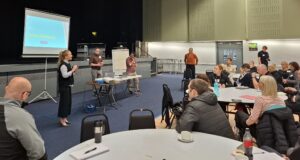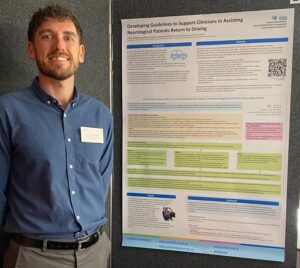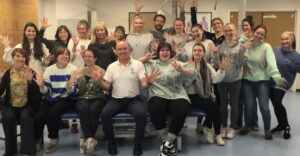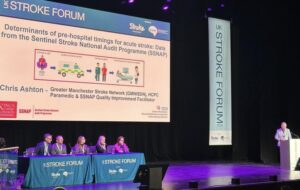|
Training and education
There has been a whirlwind of educational activity since the last bulletin and we are currently planning next year's programme for experienced staff.
On 16th October, we hosted a webinar on sex and relationships and have subsequently incorporated the online training into a new webpage full of resources. This topic was raised at our Patient & Carer Group, with members fully involved in developing and delivering the workshop. Further advanced training is planned for next year.
 On the 31st October, we co-hosted a workshop for NHS staff from our inpatient and community teams, partnering with GM Active who provide health and wellbeing facilities across Greater Manchester. This initiative was born out of the need to address new recommendations in the National Clinical Guideline for Stroke (2023) and to support cardiovascular disease prevention work across the region. On the 31st October, we co-hosted a workshop for NHS staff from our inpatient and community teams, partnering with GM Active who provide health and wellbeing facilities across Greater Manchester. This initiative was born out of the need to address new recommendations in the National Clinical Guideline for Stroke (2023) and to support cardiovascular disease prevention work across the region.
The event brought teams together to network and review guideline recommendations to build awareness of the need for aerobic training patients with other neurological conditions including stroke. The event also sought to develop a set of priorities for the future. The day was a huge success and provoked thoughts on the next steps and how can we continue to work collaboratively across the region.
In November, the latest introductory stroke study day was hosted by Manchester University NHS FT stroke services supported by the network team. Dates for 2025 are now being finalised and are listed below. study day was hosted by Manchester University NHS FT stroke services supported by the network team. Dates for 2025 are now being finalised and are listed below.
A number of local clinicians and network staff attended the UK Acquired Brain Injury (UKABIF) conference held in Manchester. Our Facilitator Cillian O'Briain (pictured right) shared a poster on behalf of the network of our driving pathway for neurological conditions other than stroke.
 Stroke and neurological Occupational Therapists from across Manchester University NHS FT came together in November to enhance their clinical reasoning and therapeutic handling skills in assessing and treating patients with upper limb difficulties. Stroke and neurological Occupational Therapists from across Manchester University NHS FT came together in November to enhance their clinical reasoning and therapeutic handling skills in assessing and treating patients with upper limb difficulties.
The training was led by Physiotherapist and British Bobath tutor, Tim Walton, and reflected current evidence and best practice. The weekend offered plenty of opportunity to acquire and practice knowledge and skills and to network with colleagues.
 Some of the network team attended the UK Stroke Forum in Liverpool in early December. Our Facilitator Chris Ashton spoke on his work with the Sentinel Stroke National Audit Programme (SSNAP) team on determinants of pre-hospital timings for acute stroke patients treated in this setting. His input has also been invaluable in developing and rolling out of the first national pre-hospital dataset - due early 2025. The conference also featured a number of other speakers and posters from clinicians across the network. Some of the network team attended the UK Stroke Forum in Liverpool in early December. Our Facilitator Chris Ashton spoke on his work with the Sentinel Stroke National Audit Programme (SSNAP) team on determinants of pre-hospital timings for acute stroke patients treated in this setting. His input has also been invaluable in developing and rolling out of the first national pre-hospital dataset - due early 2025. The conference also featured a number of other speakers and posters from clinicians across the network.
Introductory study days (stroke)
Introductory Stroke Study Day – 5th February – Salford Royal ( Mayo Building)
Introductory Stroke Study Day – May (Date TBC) – Fairfield Education Centre
Introductory Stroke Study Day – 16th September – Wrightington (provisional date)
Introductory Stroke Study Day – November (Date TBC) – Trafford General
You can view all our previously recorded webinars on our YouTube channel, with details of how to access restricted content at the bottom in the archive section. Our training website pages are also a useful source of information and include our events, Elearning packages, online resources and course information.
|